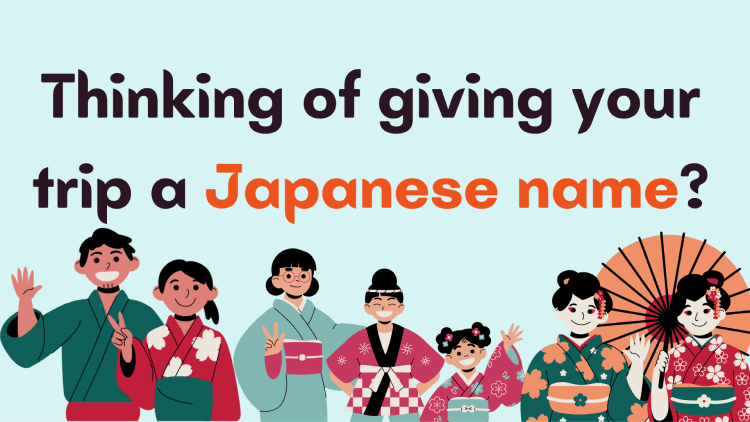Interested in Japanese names and wondering how to choose one for yourself?
Whether you’re traveling, writing, or just having fun, Japanese names are an exciting and fun pastime.
If you're planning to visit Japan, don’t forget to bring your iRoamly Japan Travel eSIM. It’s a smart way to stay connected, making it easier for you to look up name meanings on the go!
Japan Names
How are Japanese Names Structured?
In Japan, the construction of a name is generally Last Nam, then First Name, though western name order is increasingly common among young people. For a full name, the family name comes first, denoting the root of one's family tree, while the given name is... well, given, usually with consideration to its meaning or virtues the parents wish to bestow on their child.
Origins and Meanings
Japanese names can be poetic, literal or symbolic, reflecting nature, personal attributes or family origins.
For example, the surname 'Yamamoto' means 'base of the mountain', indicating a family's point of origin, something that was true for many people in feudal Japan.
Meanwhile, a popular first name like 'Yuki' can stand for 'happiness' or 'snow', depending on the kanji used to write it, and of course kanji can represent concepts as well as just physical elements.

Names can also be aspirational, representing a parent's wish for their child, or be awarded in honour of an ancestor, with some names historically being rewards officially conferred by an emperor or daimyo. This tapestry of meaning and origin has given Japanese names a rich complexity which blends Japanese tradition and personal meaning with patriarchal and national pride.
Top Japanese Names for 2024
Looking for a trendy or meaningful Japanese name?
Here’s what's popular in 2024:
For Girls:
Aiko (愛子) – “love child”
Hina (陽菜) – “sun vegetables”
Sakura (桜) – “cherry blossom”
And for boys:
Ren (蓮) – “lotus”
Haruto (陽翔) – “sunny flight”
Takumi (匠) – "artisan" or "masterful craftsman"
How to Choose a Japanese Name for Yourself
If you want to pick out a Japanese name for your own use, here are a few tips to help you find something that best suits you:
Translating your name by sound: take a phonetic approach to your actual name and see if you can find a close-sounding Japanese name or kanji. For example, “Kate” could be “Keito (ケイト)”.
Select a name generator: There are lots of online tools that can generate Japanese names based on various criteria like your birthdate, or personal favourite aspects.

Choose a name you already like: Maybe you’ve stumbled onto a Japanese name in a movie, TV show, or book and always loved it. Why not adopt it if it feels like yours?
Names to Avoid
Choosing a name from another language can be an exciting challenge if you're new to Japanese.
Steer clear of names that might have undesirable meanings, or sound like similarly problematic words. Even checking in with native speakers, or doing a little research, can help you avoid possible embarrassment.
What to Consider When Addressing Others in Japan
When addressing people in Japan, how you speak to them can establish a lot about the state of your relationship. By far the most common honorific used is ‘-san’ attached to a surname, and when in doubt is the safest way to display respect.

This is especially true in professional situations, or when meeting someone for the first time—it shows you see the other person as being at a similar level to yourself.
For the most part you should stick to surnames, unless invited to use someone’s first name. Skipping straight to a first name without invitation (known as “yobisute”) can be considered overly familiar, or disrespectful, and while as a visitor you’d likely be politely shown the correct way to address people.
FAQ
What makes a Japanese name rare?
Rarity can be based on unusual kanji characters, pictograms that are influenced by Chinese characters, or on names that may have historical meaning but not be used in modern times, such as 'Ran' (orchid) or 'Ren' (lotus).
What makes a Japanese name lucky?
Lucky names are often composed using kanji that carry connotations of luck, good fortune, or other positive qualities, for instance 'Eiko' (glorious child) or 'Daichi' (great wisdom).
What makes a Japanese name pure?
Pure names may have kanji that evoke purity or clarity, an example being 'Kiyomi' (pure beauty) or 'Masaru' (victorious).
Summary:
Japanese names are not just labels, but an artform that reflects personal and cultural identity. Whether you are choosing a Japanese name for yourself or just learning to appreciate them, names are a window into the values and aesthetics of Japanese tradition.
We hope you have fun exploring and choosing a Japanese name or two!
